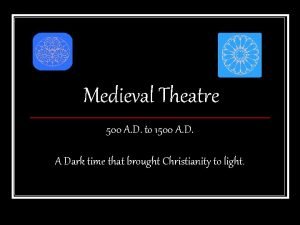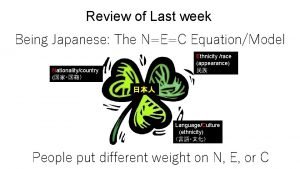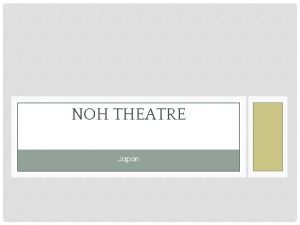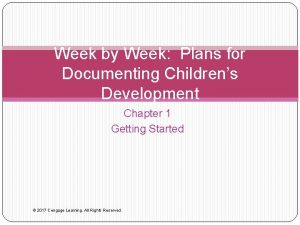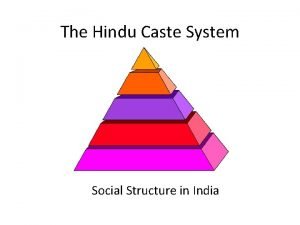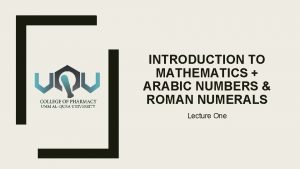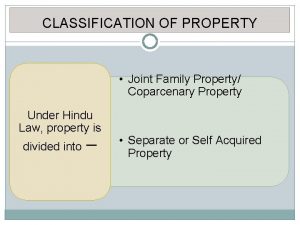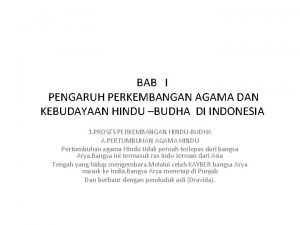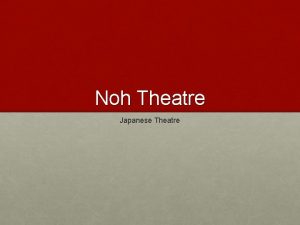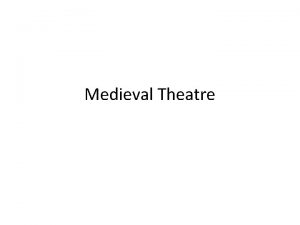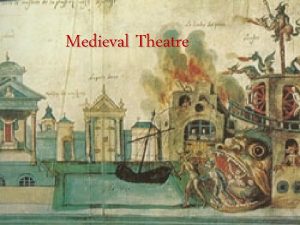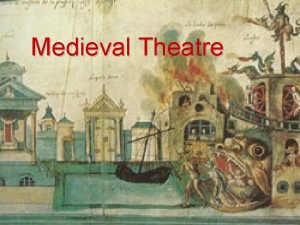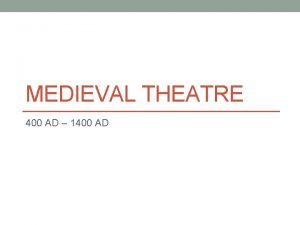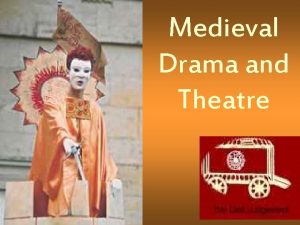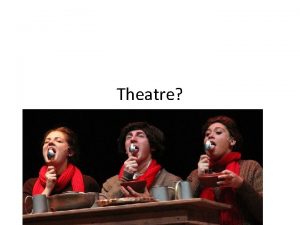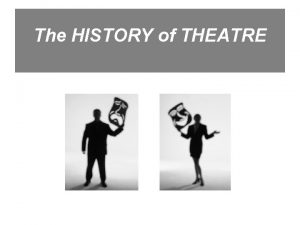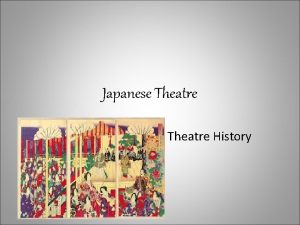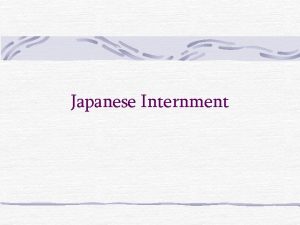Medieval Chinese Hindu and Japanese Theatre Week 10
![Medieval, Chinese, Hindu, and Japanese Theatre Week 10 [Part 1] Introduction to Theatre College Medieval, Chinese, Hindu, and Japanese Theatre Week 10 [Part 1] Introduction to Theatre College](https://slidetodoc.com/presentation_image_h2/8a9227198c57ac6c16fc92f921a466ca/image-1.jpg)


































- Slides: 35
![Medieval Chinese Hindu and Japanese Theatre Week 10 Part 1 Introduction to Theatre College Medieval, Chinese, Hindu, and Japanese Theatre Week 10 [Part 1] Introduction to Theatre College](https://slidetodoc.com/presentation_image_h2/8a9227198c57ac6c16fc92f921a466ca/image-1.jpg)
Medieval, Chinese, Hindu, and Japanese Theatre Week 10 [Part 1] Introduction to Theatre College of the Desert

Third Critique Due – 11/5/19 The Diary of Anne Frank • Critiques are expected to be AT LEAST FIVE (5) full double-spaced typewritten pages long. 1 inch margins, 12 pt. Time New Roman font. • Cite your sources APA style (go to “Son of Citation Machine” for help online with citing sources). • VERY IMPORTANT: DO NOT, I REPEAT NOT, GIVE A SYNOPSIS OF THE PLAY (A DESCRIPTION OF WHAT HAPPENS -- THE STORY, IF YOU WILL), EXCEPT FOR A VERY BRIEF ONE (ONE PARAGRAPH OR SHORTER). ASSUME YOUR READER IS FAMILIAR WITH THE PLAY. ANY ELEMENTS OF A SYNOPSIS SHOULD BE USED ONLY TO HELP SUPPORT / DEVELOP THE IDEAS YOU MENTION AS YOU ANALYZE THE PLAY / PRODUCTION. • YOUR CRITIQUE MUST BE AN ANALYSIS OF THE PLAY / PRODUCTION. • BE SURE TO BACK UP / SUPPORT / CLARIFY YOUR IDEAS WITH SPECIFIC EXAMPLES FROM THE PLAY. • Please make sure that you have one specific question you are trying to analyze and that it is clearly stated in your thesis statement.

Third Critique Due – 11/5/19 The Diary of Anne Frank Do TWO of the following: 1. 2. 3. 1. 2. 3. 4. 5. 6. 7. 1. 2. 3. 4. 5. Describe and analyze the play's characters. Are the characters clearly defined? Are they realistic or symbolic? Which characters are in conflict? How do minor characters relate to major ones? Are they mirror images, contrasts, parallels? Which characters are poorly presented? Are they incomplete, inconsistent, unbelievable? Which characters did you identify most closely with? Why? Describe and analyze the content and plot structure of the play. Is the structure serious or comic? Realistic or fantastic? If serious, is it tragic or more down-to-earth? If comic, is it plain comedy or farcical. Does it mix elements? Serious with comic, realistic with unrealistic? Is the play written in climactic form, episodic form, or some other form? What is the major conflict and its initiating incident? Does the play have an early or a late point-of-attack? How is precursor action made clear? How are complications developed and how does the play resolve? Describe and analyze theme of the play. What is the play about? Is it easy to understand or not? Does the play present the subject clearly? Does the playwright seem to have an opinion, or does the playwright appear neutral? How is theme brought about? Words? Actions? Symbols? Is there more than one theme? Are they consistent with one another?

Who are Frances Goodrich & Albert Hackett? • • • Goodrich & Hackett began their enormously successful and remarkably prolific collaboration in 1928, a partnership that lasted 34 years. The privileged daughter of well-to-do parents, Frances Goodrich attended Vassar before beginning her career as an actress, first appearing on Broadway in 1916. By the time she met fellow actor Albert Hackett in the late 1920 s she had already been divorced twice. Nine years the junior of his wife, Albert Hackett was the son of stage star Florence Hackett and brother of Raymond Hackett. The Manhattan-born Albert first appeared onstage at the age of six to help earn money for his family after the death of his father. He eventually went on to study at New York’s Professional Children’s School. Like Goodrich, Hackett met with modest success as an actor, and their initial collaboration arose as a result of their mutual desire to leave acting in favor of playwriting. The two were married while collaborating on their first Broadway hit, Up Pops the Devil. Their success on Broadway eventually led to the pair being signed as a writing team by MGM, where they launched the popular Thin Man series.

Who are Frances Goodrich & Albert Hackett? • • • While there would be another Broadway production on the Goodrich/Hackett docket in the 1940 s, The Great Big Doorstep, for the most part the couple devoted their time to screen writing. They were particularly skilled at adapting the works of others to meet the restrictions and requirements of the movies. Among their most famous film credits were adaptations of Owen Wister’s The Virginian, S. N. Behman’s The Pirate, Edward Streeter’s Father of the Bride, and the musical version of Stephen Vincent Benet’s Sobbin' Women, released as Seven Brides for Seven Brothers. Goodrich and Hackett were also among the many writers who toiled on Frank Capra’s It's a Wonderful Life. Writing the stage version of The Diary of Anne Frank was the achievement of which both Goodrich and Hackett were most proud. The job of adapting the diary had originally been offered to Lillian Hellman, who turned it down, saying that if she wrote the play “It would run one night because it would be deeply depressing. ” She, in turn, recommended Goodrich and Hackett because they possessed a “lighter touch. ” It took the couple two years and eight rewrites before they came up with a draft which pleased Otto Frank, Anne’s father. The original Broadway production received the 1956 Tony Award for Best Play, and the script received the 1956 Pulitzer Prize for Drama. Goodrich and Hackett also adapted the play for the screen in 1959. Frances Goodrich and Albert Hackett remained married until her death in 1984. Albert Hackett passed away in 1995.

Who was Anne Frank? • Here is a short documentary about Anne Frank… – https: //youtu. be/ond 6 r 5 pafjw

Summary of the Play ACT 1 – Scene 1 • We see the ending of the play before it even begins. • Otto Frank has survived the Holocaust and returns to the attic where he and his family spent two years in hiding. • Miep Gies meets him there and gives him the diary. • The stage directions give us the idea that things have been neglected and a large amount of time has passed. • Otto is old, weary, and heartbroken. We get the idea that something terrible has happened. • Miep hands him Anne's diary and Otto begins to read it aloud before Anne's voice takes over.

Summary of the Play ACT 1 – Scene 2 • • • The three members of the Van Daan family—Mrs. Van Daan, Mr. Van Daan, and Peter Van Daan—are waiting for the Frank family to arrive. Mrs. Van Daan worries that something has happened to them, while Mr. Van Daan reassures her that they have had to walk two miles, lugging suitcases. At last the Franks arrive and introductions are made. Mrs. Edith Frank, Otto Frank, Margot Frank, and Anne Frank—they all shake hands with Mr. and Mrs. Van Daan and Peter has brought his pet cat Mouschi with him. Miep and Mr. Kraler explain that they have made up the apartments in the Secret Annex the best they could and will go and get the group some ration books. Mr. Kraler explains that he and Miep will be delivering the illegal food to the Annex each day and will bring the news and other things the group might need. Mr. Frank explains that during the day the group must be silent. The workmen come from eight-thirty to five-thirty so they might be able to hear any sounds. The group must move silently without shoes on and refrain from using the bathroom or running water. They must burn their trash in the stove at night. After six, the group can talk, play games, and have supper.

Summary of the Play ACT 1 – Scene 2 • • • The room assignments are given out, and the family room or common room is designated as a place to gather and talk. The Van Daans tell Mr. Frank that they are extremely grateful for his kindness. Peter and Anne get better acquainted. Anne tells him she misses her own cat that she had to leave behind. Peter rips off his Star of David, but Anne says she can't bring herself to burn it. Anne tells her father she will think of the Annex as a peculiar summer boarding house. Anne opens a box with pictures of the movie stars she had in her room. Her father also gives her a diary as a present. Mr. Frank warns Anne that she must never go beyond the door to the Secret Annex that leads to her father's office. He tells her that, although they are contained in the Annex, she is free to think and dream because no one can put a lock on your mind. At eight o'clock, the family has to be silent. Anne and Peter feed Mouschi some milk, then Anne begins writing in her diary. We hear Anne's voice over the stage action as she explains what is happening in the Annex on a daily basis.

Summary of the Play ACT 1 – Scene 3 • • • Mr. Dussel, a Jewish dentist, has been "called up" by the Nazis—asked to surrender himself and go quietly away to a death camp. Miep's boyfriend tells her this and Mr. Kraler asks Mr. Frank if the group in the attic will take Dussel in. Mr. Kraler is extremely grateful to the group, but he soon proves to be a fussy old guy who has no kids or family. He shares a room with Anne (probably not a great idea) and immediately can't stand her. We learn that the people in the attic are near to starving, surviving on the food rations that would be allowed for three people, when there are in fact eight sharing them. It's beans for dinner, breakfast, and everything in between. Still, Mrs. Frank continues preparing and setting the table just like a regular lifestyle. Anne's prankster methods make her seem really young and silly. She steals Peter's shoes, makes fun of Mr. Van Daan, and even spills milk on Mrs. Van Daan's expensive fur coat. There's a definite divide between body and mind going on here. All the same, we can see the strain it's putting on our heroine as well as the rest of the crew trapped in the annex.

Summary of the Play ACT 1 – Scene 4 • • One night, Anne wakes up everyone in the attic with her screams. She's had a nightmare about the Nazis coming to take her away. It seems totally normal to us that her fears would manifest in this way, but everyone in the attic short of her parents seems more than a little annoyed by this. Mr. Dussel even locks himself in the bathroom; he's so angry. We see Anne's parents concerned and helpless for their young daughter who has to deal with the ugly realities of war and death. They are afraid for her as well as for themselves. Anne's request for her father's comfort after the nightmare, rather than her mother's, provides more fuel for a conflict that appears to be escalating. Mrs. Frank's feelings are extremely hurt, and Anne knows this but can't figure out how to make things work with her mom.

Summary of the Play ACT 1 – Scene 5 • • Our little Anne shows up at Hanukah as the only person who's thought about giving to others. Mrs. Frank comments that there will be no gift-giving this year, but Anne's already made super-cute gifts for everyone out of little odds and ends and her own creativity: – a crossword puzzle book for Margot (re-used of course) – a paper ball and string for Mouschi – cigarettes for Mr. Van Daan – shampoo for Mrs. Van Daan – IOUs for Mrs. Frank – earplugs for Dussel – a muffler (scarf) for Mr. Frank. There's some discussion by Mr. Van Daan about getting rid of Peter's cat. Peter swears he'll leave if the cat has to leave, but Mrs. Van Daan quickly says no one is going anywhere. While the residents go back and forth between remorse and thankfulness for their situation, including a heavy decision as to whether they should sing the Hanukah celebration song, a big noise from downstairs occurs. Peter tries to help, but knocks over a chair making a gigantic noise and everyone panics (especially Mrs. Van Daan). Even Anne faints. Mr. Frank gallantly agrees to check it out. He returns, saying a thief broke in and stole some money and a radio. The group is terrified that the thief will tell on them, but there isn't anywhere to go and no place else to hide. Instead, the scene ends with the group again returning to faith and they begrudgingly sing the Hanukah celebration song, which ironically reflects their current situation very well.

Summary of the Play ACT 2 – Scene 1 • • • The new year dawns and Miep and Mr. Kraler come bearing a cake. The residents get so jazzed up about the cake that it brings tears to our eyes. They fight like children about who should cut the cake fairly. We see the greed in Mr. Van Daan, and it's not a pretty sight. Besides trying to finagle the biggest piece of cake for himself, he asks Miep to sell Mrs. Van Daan's fur coat. Mr. Van Daan who wants to sell the memento for cigarettes. When Mr. Kraler tries to tell Mr. Frank some important information in private, it's actually Margot who goes ballistic. She wants to know it firsthand, and Mr. Frank agrees that Kraler should tell everyone what he knows. Kraler relates that there is a man who works at the business who keeps asking about the Franks, and whether Kraler knows their whereabouts. He keeps staring at the bookcase that hides the door to the secret annex. Then he asks for a raise; it's clearly blackmail. People start having hysterics, but it's the faithful Mr. Frank who makes the logical decision to pay the man half. Even if it's bribery, there's nothing they can do but sit and wait to see what happens.

Summary of the Play ACT 2 – Scene 1 • • • Kraler agrees and leaves the room. Anne fires off a storm of repressed anger about being a teenager trapped in the war. She blames the grownups for her problems and explodes on her mother. But after slamming the door and forgetting her cake, she discovers an unlikely ally in Peter. He is totally in awe of her massive demonstration of "sticking it to the man" and joins in her ranting about their situation. Peter then says she can come to his room whenever she wants to talk about things. In this scene, we get some more sporadic information from Anne. Mr. Kraler is in the hospital with some ulcers and American forces have landed in Italy. The food rations have been cut even further and everyone is starving. The scene ends with Anne not yearning for the war to be over, but simply to have someone to really talk to.

Summary of the Play ACT 2 – Scene 2 • • • All dressed up and no place to go—that's the awkward way that this scene starts. Anne's in her bathroom, getting dolled up to go on a date with Peter, to his room. But Anne in her infinite courage, takes it all on her shoulders. She's excited to be sharing something new and different, something grownup, something… normal. Even Margot admits that she's a little bit jealous—not of Peter, but that Anne has something "to live for. " Anne and Peter's "talk" in his room has all the classic drama of an oldies romance movie. It's super-cute to see them connecting on a deeper level than, "Pass the milk please. " But we are left wondering if their budding romance is simply one of proximity. Anne's conversations are extremely sensitive and spiritual. Peter's goals are much more grounded than hers and he seems like the square peg to Anne's round hole. Still, they talk the cutesy stuff of young love, asking each other if they've ever kissed anyone else and if they'll forget each other when they come out of hiding. Peter freaks about Anne possibly being prevented from seeing him again by the parents, and Anne soothes him by basically saying, "not a chance. " At which time we feel like Peter's sort of the wimpy one in this relationship until he grabs Anne by the arms and pecks her on the cheek!

Summary of the Play ACT 2 – Scene 3 • • • • Someone's been sneaking food, and we know it's a rat of a different size. If you didn't like the Van Daans before, you really don't like them now. Mr. Van Daan has been stealing food from the storage box and stuffing his own face. This leads the even-tempered Mrs. Frank to go postal. She flips out in a "righteous rage" and demands that Mr. Van Daan hit the road. We almost agree with her. But, if Mr. Van Daan goes outside, he'll surely die. Mr. Frank tries to soothe everyone by saying Mr. Van Daan won't steal again. He appeals to Mrs. Frank's sense of goodness and logic. Mr. Van Daan will die if the group kicks him out. He reminds the group, "We don't need the Nazis to destroy us. We're destroying ourselves. " It's a harsh, sad realization to come to. The group continues to argue, Anne and Margot calling for their mother to come to her senses, while Mr. Dussel is only too happy to get rid of the Van Daans because there will be more food for himself with them gone. He begins to count potatoes in a greedy fashion, re-proportioning them in an almost gleeful way. The craziness is interrupted by the arrival of Miep, who tells them joyous news about D-Day, the invasion of France by the Allied forces. The group goes from crazed insanity to euphoric in about ten seconds. There is great rejoicing. Mr. Van Daan however, is feeling totally guilty and Mrs. Frank regains her composure by forgiving him. Perhaps the most interesting part of the forgiveness is Anne's realization how she has treated her mother, "Look at me, the way I've treated Mother… so mean and horrid to her. " The good times are fleeting however, as the Gestapo have found the stolen radio and Mr. Dussel is sure they will trace it back to the group in the annex. Anne says the group is totally depressed, "Everyone is low. Even poor Pim can't raise their spirits. " But another shining example of morality comes into play here. Anne miraculously still has something to believe in: "I have often been downcast myself, but never in despair. I can shake off everything if I write. "

Summary of the Play ACT 2 – Scene 4 • • • • The tension is so high in this scene that we can almost snap it in half. The frantic dialogue of the crazed annex residents and the consistent ringing of the telephone tell us just how scared the families were that this could be the end. Miep is missing and no one has come to work in the building below, even though it's a normal Friday. The hysterics climax with Mrs. Van Daan totally freaking out and saying that she'll kill herself, which of course is followed by an argument between she and Mr. Van Daan. But then, it is contrasted with Peter and Anne, peacefully gazing together at the sky. In what is almost a religious experience, they reflect on their time in the annex and how difficult it has been. Anne's words are poetic as she tells Peter how her imagination has saved her from going crazy. Peter's response shows his down-to-earth character as he gets mad at the hopelessness of their situation. Anne puts him to shame as she tells him about the goodness of the world: "When I think of all that's out there… the trees… and flowers… and seagulls… when I think of the dearness of you, Peter… and the goodness of the people we know… Mr. Kraler, Miep, Dirk, the vegetable man, all risking their lives for us every day… When I think of these good things, I'm not afraid any more… I find myself, and God. " We're left in awe of how one person can be that at peace with her situation. Anne's faith in the world continues to her most famous line in her diary "I still believe, in spite of everything, that people are really good at heart. " There aren't many of us who could say that, given the same situation. Anne and Peter watch the sunset, but are interrupted by the harshness of reality. The group has been found out. The stage directions relay the rest of the story as the realization that they are going to be arrested dawns on each of the characters. The soldiers break down the annex door and allow the residents five minutes to pack their clothing. They aren't allowed to take anything else. Anne's voice closes the scene as she asks Miep to keep her diary safe for her.

Summary of the Play ACT 2 – Scene 5 • • • The gut-wrenching tale of what happened after Otto Frank and the others were arrested and sent to concentration camps is almost unbearable. However, Mr. Frank relays that Anne was simply happy to be outside after being locked up for two years. Miep and Mr. Kraler do their best in an extremely sad and awkward moment. Miep tells him that the office thief was the one who sold them out. She had been out to the country to get food, and when she returned, they'd already been captured. She pours coffee and listens sadly as Otto relays what had happened after the capture. Sent first to a camp in Holland then to Auschwitz in Poland, the family was then separated in September. Anne, her sister, and her mother were sent to Bergen-Belsen where Otto later learned from survivors who had known them that they had perished. The Van Daans and Dussel met the same fate. Otto was the only one rescued by the Allied forces who swept through France and other parts of Europe, but they came too late to save the rest of his family. Anne's famous line re-echoes at the very end of the scene, and Otto voices what most of the audience members are feeling by the end—that a very special person's life was taken too early. Her belief in the goodness of people, even through a horrific time, is something to be admired.

Discussion Topics • How does the play version of Anne Frank's story make it more personal for an audience? • What does the play teach us about youth? • Which of the characters deals with isolation the best? Which ones don't deal well at all? • Does the play explain any positive outcomes of World War II? • Does a crisis define who you are as a person? • Does the war define Anne? • What can the play communicate to an audience that Anne's diary can't? • What might the play not be able to convey of Anne's diary?

Looking at the Play a little Deeper Symbolism, Imagery, Allegory • Writing – Anne's dream is to become a writer: "I want to be a journalist or something. I love to write. " She wants to do great things someday and wants to improve herself through her writing. Her words in her diary reflect her youth and immaturity and then gradually become more complex and thoughtful. She expresses her unique perspective on the beauty of the world. Anne's writing becomes symbolic of achieving your dreams through self-expression and practicing your craft to become better. • Hanukah Celebration – The residents of the Annex are surprised when Anne creates little gifts for each of them for Hanukah. The simple ceremony and lighting of the menorah reminds each of them what they have to be grateful for, even if they aren't completely sure they should be grateful for anything: "We are all here, alive. That is present enough. " Hanukah is able to smooth over the tension the group is feeling, and represents to both the residents and the audience that they have to have faith to make it through their ordeal—faith in a higher power, but also faith in each other. • Peter Van Daan – Anne and Peter develop a relationship out of mutual respect. Being forced into close quarters helps them to recognize the strengths and weaknesses of each other, but also to bring on a friendship that might not have occurred outside of the Annex. Peter appreciates Anne's creativity and her boldness: "I thought you were fine just now. You know just how to talk to them. You know just how to say it. " Anne begins to accept Peter's down-to-earth nature, but more importantly, his willingness to listen. Both kids are dying to have another person their own age to talk to and Peter symbolizes the need for human relationships and friendship in the play. Even Margot admits that she's a little jealous that Peter and Anne have each other to talk to: "I'm jealous, jealous that you've got something to get up in the morning for. "

Looking at the Play a little Deeper Symbolism, Imagery, Allegory • Mouschi – A big deal is made about Peter's cat. Peter's sort of weirdly obsessed with the cat, while Anne is sad she wasn't able to bring her own cat. Mr. Frank says, "I'm glad you brought your cat" and gives it a box to sleep in. On the other hand, Mr. Van Daan really, really hates it, and threatens to get rid of it in practically every scene. Eventually, Mouschi mysteriously disappears. What happens to Mouschi is eerily similar to the situation of the Jews in Holland as well as the Annex residents. Many Jews would disappear each day during the Holocaust, never to be heard from again. Mr. Van Daan's attitude that the cat was eating up their precious resources is similar to that of the Nazi viewpoint about the Jews.

Looking at the Play a little Deeper Analyzing the Setting of the Play • The Secret Annex in German-occupied Amsterdam, Holland during World War II – Anne's descriptions of her life before she went into hiding provide a bit of background on the setting of Amsterdam, – – – – Holland. We learn that "things got bad for the Jews" during the German occupation: "You could not do this and you could not do that. " One of Anne and Peter's most hated rules were the yellow Stars of David Jews were made to wear on their clothing. Upon going into hiding, Peter burns his, saying that the stars were "Something they branded you with… That they made you wear so they could spit on you. " This brief view of Amsterdam helps us understand the forces that caused the Franks to enter into hiding. The play's events take place in the small rooms of the "Secret Annex, " a portion of Mr. Frank's office hidden behind a bookcase. The living situation is cramped and confining for the eight inhabitants. Anne gets emotional about not being able to go outside, ride a bike, or do other kid stuff. We see her youthfulness and creativity become stifled because of the close quarters. Another difficult part of living in the Secret Annex is that, since their hiding space is a portion of an office with many workers unaware of the Jews in hiding, the Secret Annex inhabitants have to be very quiet, especially during business hours. The cramped quarters, and the fear of Nazi discovery (which could mean death for them and their protectors), take a toll on the residents. They become increasingly peevish, selfish, and irrational. The dull monotony of their lives and the 24 -7 "togetherness" makes (and breaks) their relationships.

Looking at the Play a little Deeper Analyzing the Narrator - Point of View • First Person (Central Narrator) – Because the play is taken from Anne's diary, her words intermingle with the action and dialogue of the people on stage. – The diary entries are done in cool, voiceover fashion so we feel like we're actually watching Anne's diary come to life. – She's the central narrator for us but, as her voice fades, we are more into watching the characters deliver their lines. – Anne doesn't narrate the entire play, but rather comes in when we need her to explain or provide more information.

Looking at the Play a little Deeper Plot Analysis • Exposition (Initial Situation) – What Happens in the Annex Stays in the Annex • Anne and her family, as well as another Jewish family and a family friend, move into the secret rooms • • • behind Otto Frank's office in Amsterdam. The families cannot leave the small rooms or make noise during the day, and they have to depend on the kindness of two of Otto's employees to bring them food and other necessary items in secret. Anne's father gives her a diary and Anne begins to record her thoughts, feelings, and daily activities in it. Rising Action (Conflict, Complication) – Meanwhile, Back in the Attic • The residents begin their stay in the attic by trying to resume as many normal duties and routines as possible. • All three children try to keep up with their studies (even though they don't know when they'll be going back • • • to school). Mrs. Frank makes dinner, does laundry (in the sink), and continues darning socks, just like she's always done. There's a lot of discussion, reading, and everyday boredom going on. But after a while, being shut up in a box begins to take its toll on the residents. They become selfish, irritable, and increasingly more fearful of their situation. Mr. Dussel, a Jewish dentist, joins the crew and then there's even less food available to them. Anne continues to write in her diary as a form of escape.

Looking at the Play a little Deeper Plot Analysis • Climax (Crisis, Turning Point) – Somebody Snitched • One night during Hanukah, the families in the Annex hear loud noises coming from the offices below them. • • • Terrified, they listen to hear what might be going on. Peter trips over a lamp and creates a huge racket. Then the noises stop. Mrs. Van Daan goes into hysterics and Anne passes out since she is so frightened. Mr. Frank goes downstairs to investigate. He comes back to tell them that it was a thief. The person ran away when he or she heard the noise from the attic. For the time being, the danger has passed. Falling Action – We Smell a Rat • Peter and Anne begin having some conversations in Peter's bedroom. • Margot admits that she's just a bit jealous because Anne has someone to talk to. • One night, Mrs. Frank catches Mr. Van Daan stealing food from the Annex storage bins and a wild uproar • ensues. Mrs. Frank wants to cast out Mr. Van Daan, and it looks as though things might unravel pretty quickly. But Miep interrupts the argument to tell everyone news of the American invasion of Normandy, and this is able to lift everyone's spirits and the group resumes some sense of normalcy again.

Looking at the Play a little Deeper Plot Analysis • Resolution (Denouement) – The End • One day, the telephone begins to ring. The group hasn't seen or heard from Miep in a few days. • There's no one working in the building even though it's a Friday. • Anne and Peter have a deep conversation about religion and their take on the world. • Then a few cars pull up outside the Annex, and the group knows their time in hiding is at an end. • The Annex residents are arrested and sent to concentration camps. • Only Otto Frank survives. He returns to the Annex and Miep gives him Anne's diary.

Looking at the Play a little Deeper Themes • Isolation – Anne Frank's isolation is probably the most important theme in the play. The authors chose to focus on – – • this aspect of the characters' situation because it's the driving force behind almost all the action that occurs. The extreme isolation the Annex crew experiences creates arguments, selfish behavior, and depression, but it also fosters a closeness and tolerance that the characters may not have ever been exposed to in their normal daily lives. As grumpy Mr. Dussel puts it, "I'm a man who's always lived alone. I haven't had to adjust myself to others. I hope you'll bear with me until I do. " Ironically, all the characters are alone—together. The playwrights focus on the amazing survival tactics the group had to employ to survive their situation. – – Fear – The poor residents of the secret annex are literally tripping over each other in an attempt to live a "normal" life, but the fear is getting to them. – One by one, they are going to have to deal with their fears as the war looms ever closer and the hazards of living on the fringe of society meet them full blast. – For good reason, the fears for these people run deep and they're worth examining.

Looking at the Play a little Deeper Themes • Faith – When everything else has been taken away from us, sometimes all that's left is faith. Religion, ceremonies, songs, chants, prayers, and other aspects of faith keep us going when we feel like we can't take it anymore. – Faith is probably best represented in Act 1, Scene 5 when the residents celebrate Hanukah. What blows us away is how they still find the energy to celebrate and keep things as normal as possible —if you can call living in a box "normal. " – The residents of the annex are thankful (get that, thankful) for all they have. Mrs. Frank tells them, "We are all here, alive. That is present enough. " As outsiders to their situation, we might be scratching our heads at what exactly they have to be thankful for. But they are alive and they have each other, and that in itself is enough. As the Hanukah song states, "Many are the reasons for good cheer. Together we'll weather whatever tomorrow will bring. " – Faith plays an important role in the play as the residents see less and less of a way out of their meager existence. We see them now relying on the faith that has been so denied to them by the political powers that forced them into hiding. – Throughout the play, we get to see first-hand the fantastic irony that the one thing the Nazis were trying to squash (the Jewish faith) is the only thing they truly cannot kill.

Looking at the Play a little Deeper Themes • • Perseverance – Anne's story is one about survival, rather than death. – It's a theme that the playwrights of The Diary of Anne Frank really wanted to focus on. – Anne's infectious, unrelenting positivity is pinned against the greater backdrop of hatred, violence, and fear. – The fact that the residents have survived this long is a more than a miracle. It's pure persistence. Love – Even though Anne and Peter are scared out of their minds, and trying to deal with a very adult situation, there's still room for young love. They're typical teens trapped in an atypical situation and we're so proud of them for keeping things going while the world is stirring. Some things never change—and that's a good thing. • Morality – Wartime takes a toll on any economy. People are expected to give up certain comforts to help the nation win. – During World War II, many people in war-torn countries were expected to ration their food. They would only be – – allowed an allotment of bread, sugar, and other necessities. In this case, the eight people in the annex are surviving on the rations for three. They are literally starving. As Anne reflects, "We're all a little thinner. " People who don't eat get extremely grumpy and irritable. They lose focus, and it's hard to think about anything else but food (notice the scene where the family fights over the cake). Add to this the living conditions of a tiny townhouse for eight people and it's amazing that the annex residents are able to civil to one another. Does hunger outweigh morality? Maybe morality is how we handle ourselves in a crisis, or the compassion we give to our fellow man, when we ourselves have nothing. For the residents in the Annex, morality is clear by how they handle themselves in some tough situations.

Looking at the Play a little Deeper Themes • Goodness – – • Nobody was looking at Anne Frank—especially not the Nazis when they destroyed her life, nor the rest of the world as she became one of the six million casualties of the Holocaust. But she still strived to be good. She wanted to make a difference, and that kind of thought process—as reflected in the play—is truly powerful. Warfare – – – This theme pretty much speaks for itself. It's like the sneaky shadows hiding in every corner of the play. Anne's life was so overshadowed by warfare that she ate, slept, and dreamed warfare. Unfortunately during WWII, children were grossly affected by the war. Those who weren't victims were fighting, and those who weren't fighting were displaced—lost from their families and loved ones. All in all, the 1940 s was a pretty bad time for a lot of folks. Warfare overshadows everything the residents of the Annex do. They're forced into their situation by the political aspects of the war, and they can't leave until the war is over. They fear for their lives because of the war's aspects and it's the sole cause of their suffering and grief. Warfare also contributes to several other themes—we can think of it as an umbrella theme that lots of other themes fall under. Isolation, survival, and fear are the direct relations of war. We as the audience realize how lucky we are that this wasn't our life, and the play almost begs us to remember this after we leave theater and go about our daily, peacetime lives.

Looking at the Play a little Deeper Themes • Youth – One thing the playwrights try to impart to us is that there's no stopping the power of youth. – Anne makes it clear that she won't stop growing up, no matter what her situation. She plays and is silly, fights with her mom, idolizes her dad, and yearns for normal teen things like girl talk, going to the movies, and friendships. – She doesn't forget how to have fun, but she does manage to do a lot of growing in the two years she's stuck in the attic. She even manages to teach Peter a thing or two about how not to be a stick in the mud. – Anne's changes are physical, mental and spiritual. She grows taller and gets her period, but she also starts to realize some important life lessons that signal her transition into being an adult. She forgives and makes peace with her mom, stops picking on Peter long enough to become a true friend to him, and realizes her true talent for writing. But she also is able to contemplate a bigger context beyond herself and her situation. – She recognizes the good in the world and the spirituality it holds for her. In this, she is saved.

Looking at the Play a little Deeper • • The play is based on Anne's diary, a memoir about her time in hiding during the Holocaust in German-occupied Holland. The stage elements and directions provide the action and emotional state of the characters, while the scenery and props provide a backdrop for the actors. The dialogue is the chief method of characterization and plot progression for the play. The drama even provides stage setup, costumes, pronunciations and other information important for a full-on theatrical production of the play. The title, though different than Anne's actual diary, is very similar. While the diary is called Anne Frank: The Diary of a Young Girl, the play is titled The Diary of Anne Frank. The playwrights were more concerned with the overall effect of Anne's diary rather than every, single one of her words. It makes sense that the diary as a whole, what it stands for, would be the central focus for the play, rather than Anne's own coming of age story. Otto Frank's last words in the play are "She puts me to shame. " He seems to echo the thoughts of the audience. It's simply incredible that a teenage girl under the worst circumstances could still be able to focus on the positive aspects life and humanity have to offer.

Looking at the Play a little Deeper • • • Because of Anne’s diary, we learn about the homely details of this most incredible example of the will to survive and of the selflessness of a few friends on the outside who provided food and protection. For more than two years, eight human beings never went outdoors, kept completely silent for about ten hours everyday when strangers were working in the warehouse downstairs , never stood by a window during daylight, never discarded rubbish that might betray them, never drew water or flushed the toilet when there was anyone else in the building, never did anything that might indicate that the attic was anything except and abandoned storehouse. If eight people of different ages from different families had succeeded in maintaining such a sensational secret for a week, it would have seemed remarkable. But to have kept the secret for two years and a month would seem fantastic if the diary and other records did not exist to prove it. The diary would not have such a record of events and techniques. Fundamentally, it is a portrait of adolescence. The hardships and the emotional strains of the secret household are hardly more than background. In the foreground is the figure of an enchanting girl. Her vitality rushes at the reader. Anne’s inner life flourishes. She had every reason to look forward to the career of a writer. For her diary is an extraordinary mirror of a human being on the threshold of life – unpredictable, impulsive, brash, but also intelligent, thoughtful, affectionate and aspiring. Anne’s character is studious and religious, aware of the mysteries of life and eager to penetrate them. She has enough skills as a writer to express ideas easily. Even though the play uses a few direct quotes from the diary – the play is virtually an independent work.

Essay Topics These are some ideas but you are not limited to these! The discussion topics can be used as an essay topic as well… • What does the role of the diary play in Anne’s life? How is it a historical document? • How does the play show the humiliation and nobility of the human spirit? • What would you do if laws were passed against you because of, say, the color of your hair, eyes or skin, your grades in school, or your height? How would you feel and react? Would you react like any of the characters in the play? • Which character of the group in hiding do you like best? Why? • Compare and contrast the film version (1959 only [this is based off of the original play– You. Tube) to the play.

Works Cited Charlebois, J. (2018). The Diary of Anne Frank News Round Up. Retrieved October 9, 2018, from https: //shakespeareinaction. wordpress. com/category/in-the-news/ Shmoop Editorial Team. (2008, November 11). The Diary of Anne Frank (play) Summary. Retrieved October 9, 2018, from https: //www. shmoop. com/hackett-goodrich-anne-frank-play/act-1 scene-5 -summary. html Writers Theatre. (2018). Frances Goodrich & Albert Hackett biography. Retrieved October 9, 2018, from https: //www. writerstheatre. org/frances-goodrich-albert-hackettbiography
 Hindu theater
Hindu theater Shikabu
Shikabu History of theatre architecture
History of theatre architecture Pageant wagons medieval theatre
Pageant wagons medieval theatre Medieval theatre timeline
Medieval theatre timeline Medieval theatre facts
Medieval theatre facts Medieval theater timeline
Medieval theater timeline Medieval theatre timeline
Medieval theatre timeline Old age theatre makeup
Old age theatre makeup Anglo chinese school primary
Anglo chinese school primary Last week in japanese
Last week in japanese Japanese noh theatre
Japanese noh theatre Week by week plans for documenting children's development
Week by week plans for documenting children's development Which is powerful caste in india
Which is powerful caste in india Roman numerals objectives
Roman numerals objectives 489 in hindi numbers
489 in hindi numbers Hindu vs islam
Hindu vs islam Adat bersanding pengaruh hindu
Adat bersanding pengaruh hindu Etika agama hindu
Etika agama hindu Empat fase perkembangan agama hindu di india
Empat fase perkembangan agama hindu di india Hindu reincarnation chart
Hindu reincarnation chart Periodo de la literatura hindú que el contenido es profano
Periodo de la literatura hindú que el contenido es profano Puja tray items labelled
Puja tray items labelled Hindu temple arizona
Hindu temple arizona Hindu beliefs
Hindu beliefs Ashtangika marga
Ashtangika marga Obstructed heritage and unobstructed heritage
Obstructed heritage and unobstructed heritage Percampuran kebudayaan dravida dan arya menghasilkan agama
Percampuran kebudayaan dravida dan arya menghasilkan agama Hinduarabic
Hinduarabic Karma marga
Karma marga Reading hindu temple
Reading hindu temple Pedagang penguasa dan pujangga pada masa klasik hindu budha
Pedagang penguasa dan pujangga pada masa klasik hindu budha Varnashrama system
Varnashrama system Wilayah kekuasaan kutai
Wilayah kekuasaan kutai Hindu sembolleri
Hindu sembolleri Hindu triumvirate
Hindu triumvirate



